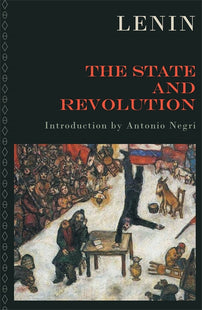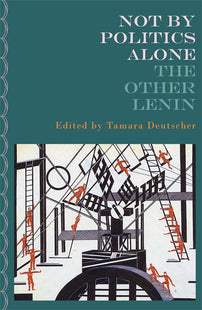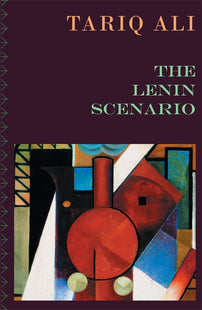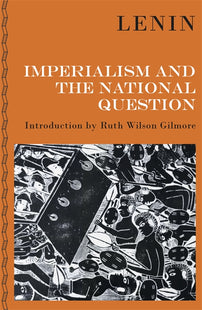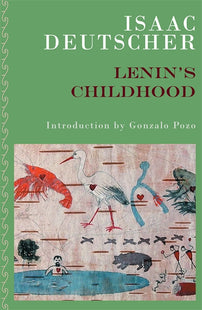Reclaiming Lenin
For the centenary of Vladimir Lenin's death, Paweł Wargan revisits Lenin's revolutionary thought and shows how Lenin can help us navigate our political conditions today.

Towering, bird-like structures of green steel form a permanent backdrop on my hometown’s horizon. The cranes of Gdańsk’s shipbuilding port are visible from nearly every elevation in the city. Dulled by rust, raised or stooped towards the ground, they seem to stride across the city’s edge — steampunk companions to the Hanseatic, Teutonic, and Gothic facades that line the cobbled streets of our Old and Main Town. Beneath the cranes, parts of a once-mighty industry lie in ghostly ruin. By the yacht-building port, artists have taken residence in former engine-rooms. A nightclub now occupies the electricians’ workshops. At its peak, the Vladimir Lenin Shipyard employed some 20,000 workers. Over 1,000 ships would depart its dry-docks for the Baltic Sea.
But the jobs left with Lenin’s name. The Gdańsk Shipyard, as it is now known, has been ravaged by debt and privatization. Chopped and diced by investors, it now employs some 2,000 workers. Along with the jobs, something particular about the experience of Poland’s workers disappeared, too. In nearly every decade since the fall of Poland’s socialist project, the country has seen major strikes and protests challenging the imposition of neoliberal policies by the new order. We heard little about them then and we hear little about them now. The anxieties that underpinned these protests have been papered over. The new liberal elites’ triumphalism overruled the experiences of those they trampled. We lost the jobs, but we also lost the ability to know the life force of the nation: its workers.
The banishing of Lenin from the surface of our lives, then, also banished him from its depths. Lenin was, above all, a student of a world measured in heartbeats — not profit. Leon Trotsky called him the “first worker” of the transformation of the old world. “To be able to direct such a revolution, without precedent in the history of peoples,” Trotsky wrote, “it is most evidently necessary to have an indissoluble organic connection with the main strength of popular life, a connection which springs from the deepest roots.” What can we gain by reclaiming Vladimir Ulyanov today? Above all, we gain a method for recovering that “indissoluble organic connection” with the motor force of history: the oppressed. In turn, we gain a guide through the ruins of our defeated past and futureless present.
Lenin passed away a century ago — before the nation he helped found brought fascist colonialism to its knees, and before the inheritors of the colonial project defeated that nation. He did not see Yuri Gagarin — the son of a carpenter and dairy farmer — reach for the stars. Nor did he see the rise of the terrible power of the atom. He did not see the great wave of decolonization that the October Revolution helped put in motion. Nor did he see the vicious reaction against it. He did not see his name rise above the gateways of Gdańsk’s shipyard, only to be taken down. But if we left him behind, he did not leave us. Lenin, as Langston Hughes reminds us, “walks around the world.”
[book-strip index="1"]
On Class and Party
Whether we recognize it or not, we remain steeped in bourgeois thought. It emerges in the imperative to vote for the “lesser evil” and in the surreptitious ways in which we put our trust in the institutions of the ruling class when we implore them to act. We can see it in the persistent moral inviolability of Western hegemony, which, time and again, dupes us into turning against its adversaries. We see it when we succumb to political dejection, pretend that politics is not our concern, or abandon the perspective of class in favor of a politics that says “we are all in this together.”
Lenin saw the dangers of a politics disconnected from the people it purported to serve. Much of his life’s work sought to bring revolutionary forces in step with the masses — to anticipate their demands, trace their movements, feel their revolutionary pulse, and move away from a political horizon defined by the broken status quo. In 1896, a wave of strikes broke out in Saint Petersburg and soon spread across the nation. They represented, Lenin later wrote, an “awakening popular movement”. But the revolutionary leaders of the time had not anticipated the revolt. They lacked, Lenin wrote, “consciousness and initiative.” Their theories and actions “lagged behind” those of the striking workers, and “they failed to establish a constant and continuous organization capable of leading the whole movement.” The strikes were crushed, and no infrastructure remained to pick up the pieces. The party did not know the people it sought to liberate.
In the years that followed, Lenin committed himself to developing a rigorous class analysis. In one of his early works, The Development of Capitalism in Russia, Lenin looked closely at the condition of the workers and peasants in the country. He observed that Russia’s peasants shared characteristics with its proletariat. Like urban workers, most peasants earned a living by working the land of others — as agricultural wage-workers. At the same time, a minority of peasants were increasingly “buying land, improving their farms, introducing iron ploughs, developing grass cultivation, dairy farming.” In other words, the frictions of class antagonism had already reached the countryside. It was on the basis of his meticulous study of the conditions of the peasant that Lenin came to understand the necessity of deepening the unity of the peasantry and the proletariat in the struggle against Tsarist rule and capitalism. This innovation would ring out across anti-colonial struggles in the decades to come — in nations that had no proletariat at all but found in Marxism a lodestar.
But, of course, merely understanding the conditions of capitalism is not the motor force for revolution. Russia’s workers and peasants had to be organized. Lenin’s two major works on organization — What is to be done? and One Step Forward, Two Steps Back — sought to define the organizational forms that the party of the oppressed would need to take to win. He understood that his world, as Marx had written, would long be “stamped with the birthmarks of the old society”. Victory would be “impossible without a long, stubborn and desperate war of life and death, a war demanding perseverance, discipline, firmness, indomitableness and unity of will.” Here, the 1896 strikes loomed large in his mind. Spontaneous outbursts of worker action would be insufficient to overthrow the Tsar or the rising bourgeoisie. The kind of unity Lenin envisioned required the formation of an instrument capable of unflinchingly holding and advancing the aspirations of the working class and peasantry as a whole. The Party, he wrote in What is to be done?, had to be tuned with the sensitivity of an orchestra:
“In order that the centre can not only advise, convince and debate with the orchestra – as has been the case till now – but really to direct it, we need detailed information: who is playing which violin and where? What instrument is being mastered and has been mastered and where? Who is playing a false note (when the music starts to grate on the ear) – and where and why? Whom to relocate to where and how in order to correct the dissonance?”
If the role of the Party is to raise the consciousness of the working class — to inject into it an awareness of the grating frictions of class — it cannot be rooted in individualism or spontaneous action. It cannot afford irresolution or public strife. “The stronger our party organizations…the less wavering and instability there is within the party,” Lenin wrote, “the broader, more varied, richer, and more fruitful will be the party’s influence on the elements of the working-class masses surrounding it and guided by it.” The question of submitting to party discipline — a question, really, about the party’s willingness to adhere to the interests of the oppressed — underpinned the split between the Bolsheviks and the Mensheviks in 1912. It would also define one of the major historical fissures in the progressive movement.
[book-strip index="2"]
On Opportunism
That same year began a process that would see these fault lines deepen in magnitude and stretch across frontiers. In November, Europe’s socialist parties met in Basel, Switzerland. They sensed a terrible war on the horizon, and vowed to mobilize Europe’s working people against it. They would endeavor to turn the inter-imperialist war into a civil war — pointing their guns not at each other, but at the ruling classes that threatened to cast Europe into the abyss. But the commitments made in Basel did not survive the outbreak of war. That conflict — both unspeakably brutal and profoundly clarifying — would produce another critical juncture in Lenin’s thought.
In 1915, Europe’s socialists met at the Hotel Beau Séjour in Zimmerwald, Switzerland. Only the revolutionary socialist bloc stuck by its earlier pledges. Headed by Lenin, the group issued a Manifesto. “Irrespective of the truth as to the direct responsibility for the outbreak of the war, one thing is certain,” the Manifesto said, “the war which has produced this chaos is the outcome of imperialism, of the attempt on the part of the capitalist classes of each nation to foster their greed for profit by exploitation of human labor and of the natural treasures of the entire globe.” At Zimmerwald, the revolutionary bloc urged workers to reject the war, to resist their ruling classes, and to begin to construct a new society.
But the poles that emerged at Zimmerwald pulled in different directions. If one drove towards revolution, the other sought to lower the temperature, to temper the in-fighting, and in doing so conceded ground to the “social-chauvinists” for whom the “defense of the fatherland” took precedence over social emancipation. A third group — the centrists — hoped against hope that the forces of collaboration and liberation could be bridged. Although the revolutionary bloc was in the minority, Lenin saw that it could not be reconciled with the other positions. He sought to consolidate the radical bloc — shedding the inertia of those who refused to put the old world behind them. He could not mend what was beyond repair.
In the years leading up to the splits within his party and the European socialist movement, Lenin dedicated many pages to exposing the mechanisms of opportunism. He called it the “principal enemy” of the proletarian movement. Opportunism, Lenin showed, came wrapped in the language of class struggle. It promised to secure short-term gains for workers — higher wages, lower working hours, or better working conditions. But its class essence was bourgeois. It did not seek to challenge the ruling class, because it sustained a confidence in the ruling class that it did not extend to working people. And so it sought not to liberate workers, but to redirect crumbs from the tremendous profits of the bourgeoisie towards them — a temporary and ultimately fruitless strategy of lowering the temperature of class struggle to preserve the ruling order.
“Opportunism does not extend recognition of the class struggle to the cardinal point, to the period of transition from capitalism to communism,” Lenin wrote in The State and Revolution in 1917. “Only he is a Marxist who extends the recognition of the class struggle to the recognition of the dictatorship of the proletariat.” In other words, opportunism was the repudiation of the possibility that the workers might seize the instruments of the state — of the very possibility of victory. The implications were not abstract. After crushing the last major uprising of the German Revolution, the German Social Democratic Party ordered the killing of Karl Liebknecht and Rosa Luxemburg in January 1919, dealing a final blow to the prospects of a worker-led state in the country. It bears stating that the same party that so vociferously supports Israel’s genocide in Gaza today once helped pave the road towards Nazism.
The charge of opportunism, then, is a concrete instrument to defend the fragile future from the deadweight of the past. Underneath it lies an expansive and riveting vision of political possibility. Lenin’s politics, French philosopher Alain Badiou wrote, envisioned not just a compromise between existing political factions, but the total remolding of the state apparatus in the image of the oppressed, “shattering the economic oligarchy and entrusting production, both industrial and agricultural, no longer to the private ownership of the few, but to the management of all those who work.” Badiou called this the first “truly modern” politics, because it defined the political horizon for the modern age as one of final liberation.
[book-strip index="3"]
On Imperialism
Dismayed by the betrayal of Europe’s social democrats, Lenin’s focus turned to the international situation. It was at that time that he wrote one of his most important texts: Imperialism, the Highest Stage of Capitalism. Lenin recognized imperialism not as a set of state policies, but as a distinct stage in the development of capitalism. Organically, competition produces its opposite as firms consolidate to seek ever-greater advantage. Over time, monopolies exhaust their national markets and turn their sights abroad, capturing ever greater shares of the global market. The recognition of imperialism as an evolutionary stage of capitalism helped produce insights into two questions that had long troubled the communist movement: Why had the revolution not come to Europe? And from where will liberation spring?
The first insight concerned the contradiction between workers in the imperialist countries and the oppressed of the colonies. The plunder of humanity, Lenin recognized, helped the ruling classes to “bribe” workers into submission. This is a position that Lenin expressed most forcefully in 1920, in the Preliminary Draft Theses on the Agrarian Question for the Second Congress of the Communist International:
“The industrial workers cannot fulfill their world-historical mission of emancipating mankind from the yoke of capital and from wars if these workers concern themselves exclusively with their narrow craft, narrow trade interests, and smugly confine themselves to care and concern for improving their own, sometimes tolerable, petty bourgeois conditions. This is exactly what happens in many advanced countries to the ‘labor aristocracy; which serves as the base of the alleged Socialist parties of the Second International.”
A segment of the working class in the imperialist heartlands, bribed with the super-profits generated by the systematic plunder of humanity, would drag down the revolutionary aspirations of the working class as a whole. These bribes, Lenin wrote, “create something like an alliance…between the workers of a given nation and their capitalists against the other countries.” Imperialism’s mutation of class dynamics helped explain the split on the question of the First World War, which led to the collapse of the Second International.
But the rise of monopoly power — reflected in a new, international hegemony of capital that “increasingly transforms the ‘civilized’ world into a parasite on the body of hundreds of millions” — was also matched by new avenues of liberation. In 1916, men and women of the Irish Volunteers and the Irish Citizen Army launched an armed insurrection against British colonial rule in what became known as the Easter Uprising. The crises of imperialism, Lenin observed at the time, fanned the “flames of national revolt… in the colonies and in Europe”. Lenin railed against the “monstrously doctrinaire and pedantic” views of comrades like Trotsky, who saw anti-colonial uprisings’ national aspirations as antithetical to the project of communist internationalism — not to speak of “the ‘accidental’ coincidence of opinion held by a Social-Democrat and a representative of the imperialist bourgeoisie.” He insisted that support for anti-colonial, nationalist movements was essential to the revolutionary struggle:
“The dialectics of history are such that small nations, powerless as an independent factor in the struggle against imperialism, play a part as one of the ferments, one of the bacilli, which help the real anti-imperialist force, the socialist proletariat, to make its appearance on the scene.”
Lenin had “no doubt that the age-old plunder of India by the British, and the contemporary struggle of all these ‘advanced’ Europeans against Persian and Indian democracy, will steel millions, tens of millions of proletarians in Asia to wage a struggle against their oppressors.” His insistence in the need to support movements for national liberation would set the tone of the Communist International, where Lenin vowed that the Soviet Union would lend a “helping hand” to the colonized masses. That policy would, in turn, help to power a wave of decolonization and national struggle from China to Cuba, Ghana to Vietnam, South Africa to Palestine.
[book-strip index="4"]
Lenin Lives
When news of the Tsar’s abdication reached him, Lenin made his way back to Russia from exile in Switzerland. He was greeted at Petrograd’s Leningradskaya Station by a throng of supporters. There, he delivered a speech that would form the nucleus of his historic April Theses, which burst through left consensus in calling for a second revolution that would dismantle the frail bourgeois state that emerged just months earlier. “The people need peace; the people need bread; the people need land,” he said. “And they give you war, hunger, no bread — leave the landlords still on the land…”
This was the language of the cadet seeking respite from war. It was the language of the textile weaver seeking bread for her hungry children. It was the language of the horseless, illiterate peasant toiling on land not his own. It was simple language. It was the language of masses who for years — in fits and starts — had waged a hard battle against the indignities of their world. And it would produce the rallying cry of October: Peace! Land! Bread!
What is the rallying cry of our coming revolution? To what extent are the oppressed – the proletariat, the precariat, the homeless, the unemployed, the landless peasants, and the colonized – prepared to put their weight behind the prescriptions of the left? Are we present in their struggles – and in what ways? What is their level of consciousness? What is ours? How do we know that what we propose is right and that our actions measure up to the task ahead?
Gdańsk’s shipyards bore Lenin’s name because he trialed a method that helped ordinary people navigate these questions towards victory. In Poland, these lessons have not just been lost — they have been banished from the historical and intellectual record as a relic of a bygone “totalitarian ideology”. With the collapse of the socialist project and the so-called “End of History,” the confidence that these lessons once generated has dissolved into pessimism, dejection, and precisely the kind of surreptitious commitment to the status quo that Lenin critiqued as “opportunism.” As the Polish political scientist Filip Ilkowski has argued, Poland’s anti-communism has taken on an ideological character. Its function is “not to explain a particular social phenomenon, but to legitimate the existing structure of class power.” Anti-communism, then, operates to disable the kind of piercing theoretical inquiry that Lenin championed.
The consequences are dire. With echoes of Zimmerwald, Poland’s left parties have all yielded to the war frenzy. Indeed, they have become some of the most bloodthirsty and pro-war voices in the country, aligning themselves both with the most reactionary elements in our ruling class and implicitly with the expansionist agenda of US imperialism. This capitulation reflects a profound disconnect with the masses, contributing to the growing demobilization of the working classes who can no longer see a horizon beyond neoliberalism. It also reflects a deep poverty of theory, which has failed to investigate the ways in which Poland serves as an appendage — both economic and military — of the Atlanticist order. The rejection of the “totalitarian Marxist camp,” then, has masked a total surrender to bourgeois thought, which now undergirds the left’s alliance with the neoliberal coalition that prevailed in the October 2023 elections. The left has been reduced to an accessory in a spiraling conflict between factions of the capitalist bourgeoisie. Perhaps that is why it received the lowest levels of working class support of all the parties contesting the recent election.
Opportunism, of course, is not confined to Poland. Neither is the lack of political imagination and theoretical integrity that has characterized our movements in the past decade. The collapse of state socialism — and with it, the revolutionary horizon – has cast a very long shadow over progressive forces. In many parts of the world, even as demands for “systems change” grow louder, the theories and strategies underpinning them resolve into a politics of supplication that focuses on appealing to existing institutions rather than building new ones – a politics from above that refuses to walk in step and build with the masses. This has left movements unprepared to channel the great crises of our generation – from the great recession and the Iraq War to the Black Lives Matter movement and the genocide in Gaza – towards a revolutionary politics. If we fail to understand the contradictions of class and empire that shape our world with the theoretical and strategic rigor that was characteristic of Lenin’s work, we set ourselves up to repeat 1905 ad infinitum: greeting each new shock, each new war, each new outbreak of spontaneous rage with surprise and political inertia. Never in history has a transformation on the scale necessary today been achieved through such means.
Lenin provides an antidote. He was a student of the world as it was, insisting that “the very gist, the living soul of Marxism [is] a concrete analysis of a concrete situation.” The clarity of his thought helped guide a historic movement to victory — the first victory, Badiou wrote, “in the whole future of humanity, of a revolution which goes beyond… the rule of private property, inequality, and the hereditary transmission of accumulated wealth.” With that, Lenin proclaimed the arrival of the era of “victorious revolutions.” By understanding the world he lived in, by insisting on the firm adherence to the perspective of the most oppressed both within nations and beyond them, his life’s work saw permanent pathways to human liberation – to the final defeat of classes – flower all around us. In reclaiming Lenin, we can find those pathways once again.
[book-strip index="5"]
